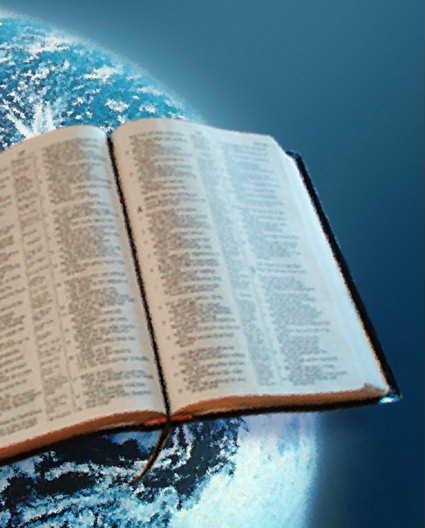Here in this article, Polly Gwinn gives us a short, general overview on the books or book groups of the Bible.
I think this can be helpful in the overall understanding of God's Word; seeing different partitions with their
respective subjects gives a vivid glance of the ensemble.
DEFINITIONS
by Polly Gwinn, August 2007
| PENTATEUCH: The first five books of the bible meaning “five books”, in Greek. They are also known as the books of the Law, TORAH, in Hebrew, because they contain the laws and instructions God gave Moses for the people of Israel. These books were most likely written by Moses, except for the last chapter of Deuteronomy which tells about Moses’ death. GENESIS: The word Genesis means beginning. The book of Genesis is about many beginnings; the beginning of the universe; the beginning of man and woman; the beginning of human sin; the beginning of God’s promises of salvation and about God’s special people and His plan for their lives. We learn about Adam and Eve, Noah, Abraham, Isaac, Jacob and Joseph and his brothers. EXODUS: The word Exodus means going out. Exodus continues the story of God’s chosen people, the nation of Israel. It tells how God called Moses to lead the people out of slavery in Egypt to the promised land of Canaan. Through the miracles of the ten plagues and the crossing of the Red Sea, God showed His people that He was more powerful than any Egyptian Pharaoh. While the people of Israel where traveling in the dessert, God gave them a |
 |
LEVITICUS: Leviticus means about the Levites. The Levites were God’s priests, and the book of Leviticus contains many of the rules they needed to do their work; rules for worshiping God and for making sacrifices. In Leviticus 11:45 God says, “be holy, because I am holy”. The rules God gave Israel in the book of Leviticus helped the people live holy lives.
NUMBERS: Numbers gets its name from the two accounts in chapters one and twenty six of the numberings or counting of the people of Israel. The rest of the book tells about the thirty eight years of wandering in the desert. God’s continual care for His people is shown throughout the book of Numbers. He miraculously supplied them with water, manna and quail. He continued to love and forgive the people even when they complained, grumbled and rebelled against Him.
DEUTERONOMY: Deuteronomy means second law. After forty years the Israelites were about to enter the promised land of Canaan. Before they did, Moses wanted to remind them about all that God had done for them and about the laws they must continue to obey as God’ chosen people. He also emphasized that they must also teach their children to love and obey God. Deuteronomy ends with the renewal of God’s covenant with Israel, Joshua’s appointment to be the new leader and Moses’ death.
HISTORY: The books from Joshua through Esther (Joshua, Judges, Ruth, 1+2 Samuel, 1+2 Kings, 1+2 Chronicles, Ezra, Nehemiah, Esther) cover about 800 years of Israel’s history. They tell about the Israelites conquering Canaan, the reigns of the kings, the division of Israel into northern and southern kingdoms, the fall of the northern kingdom to Assyria, the exile of the southern kingdom into Babylon, and the return to Jerusalem and Judah.
POETRY: The next five books of the Old Testament (Job, Psalms, Proverbs, Ecclesiastes, Song of Songs) are books of poetry and wisdom. Hebrew poetry often uses pairs of lines. The second line either repeats the thought of the first or gives an opposite. Look for these pairs of lines as you read especially in the book of Psalm.
PROPHECY: The last seventeen books of the Old Testament are books of prophecy and each book named for its author except for Lamentations (Isaiah, Jeremiah, Lamentations, Ezekiel, Daniel, Hosea, Joel, Amos, Obadiah, Jonah, Micah, Nahum, Habakkuk, Zephaniah, Haggai, Zechariah, Malachi). God sent these prophets at different times in Israel’s and Judah’s history. They called the people back to God and taught them that God would punish their disobedience.
NEW TESTAMENT HISTORY: The first five books of the New Testament tell the story of Jesus’ life and of the beginning of the Christian church. The four gospels tell us almost everything we know about Jesus Christ. The word gospel means good news. These four books tell us the Good News that Jesus is the Son of God and that He came to earth and died for our sins. The book of Acts continues the story from Jesus’ return to heaven to Paul’s imprisonment in Rome.
LETTERS: Except for the last book, Revelation, the rest of the New Testament is made up of letters written by leaders in the early church to local churches and individuals. There are twenty-one letters. Thirteen were written by Paul, one (Hebrews) is anonymous, one is by James, two by Peter, three by John and one by Jude.
REVELATION: This is the only book of its kind in the New Testament. It is a book about the end of this present world and the beginning of a new heaven and a new earth. The book of Revelation was written by the apostle John during his exile on the island of Patmos. While John was there, Jesus Christ gave him a vision of what would happen in the future. John wrote this book so Christians who were being persecuted would trust that God controls whatever happens here on earth. John’s vision shows that Jesus is the ruler over everyone and everything, even powerful human governments and He will judge and punish whatever is evil. It also gives Christians a picture of heaven where we will be with Jesus for eternity.